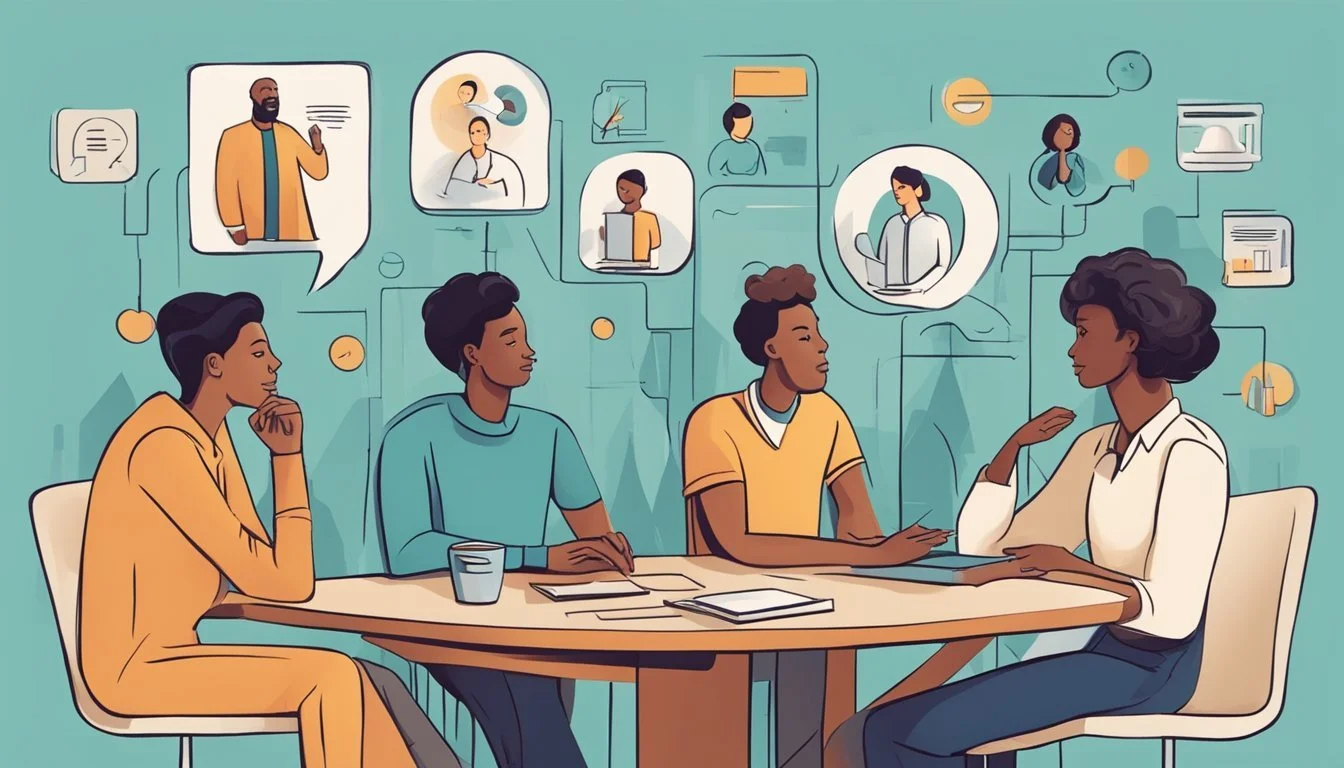12 Emotionally Intelligent Responses to Difficult Situations
Mastering Composure in Challenging Times
Emotional intelligence plays a crucial role in navigating challenging situations effectively. When faced with difficult circumstances, our responses can significantly impact outcomes and relationships. Developing emotionally intelligent ways to handle tough moments can lead to better communication, reduced stress, and improved problem-solving.
By cultivating self-awareness and empathy, individuals can learn to respond thoughtfully rather than react impulsively during tense interactions. Emotionally intelligent responses allow for more productive conversations and help maintain positive connections even in trying times. This article explores twelve strategies for applying emotional intelligence to navigate difficult situations successfully.
1) "It's understandable to feel this way" - Anonymous
This simple yet powerful phrase acknowledges the validity of someone's emotions. It demonstrates emotional intelligence by showing empathy and understanding towards another person's feelings.
Using this response in difficult situations can help defuse tension and create a supportive atmosphere. It lets the other person know their emotions are recognized and accepted without judgment.
This phrase is particularly effective when someone expresses feelings of frustration, sadness, or anger. It allows them to feel heard and validated, which can be crucial in maintaining open communication.
By saying "It's understandable to feel this way," one creates space for the other person to explore their emotions further if needed. This can lead to more productive conversations and problem-solving.
The statement also helps maintain neutrality in charged situations. It acknowledges feelings without necessarily agreeing with actions or opinions, allowing for a balanced approach to difficult discussions.
2) "Let's take a moment to think about this" - Anonymous
This simple yet powerful phrase can defuse tense situations and promote thoughtful responses. By suggesting a pause, it creates space for reflection and cooler heads to prevail.
In heated moments, this statement encourages all parties to step back and consider the bigger picture. It allows time for emotions to settle and rational thinking to emerge.
The phrase also demonstrates emotional intelligence by acknowledging the complexity of a situation. It shows respect for others' perspectives and a willingness to carefully consider all aspects before reacting.
Using this approach can lead to more productive discussions and better decision-making. It helps prevent hasty reactions that may be regretted later.
This technique is valuable in both personal and professional settings. It can be especially useful for leaders and mediators when navigating conflicts or difficult conversations.
By taking a moment to think, people often gain new insights or find creative solutions they might have otherwise missed. This brief pause can make a significant difference in outcomes.
3) "Can we find a compromise?" - Anonymous
This question demonstrates emotional intelligence in challenging situations. It shows a willingness to collaborate and find solutions that work for all parties involved.
Asking about compromise opens the door for dialogue. It signals that the speaker is open to alternative viewpoints and ready to explore middle ground.
Compromise often leads to better outcomes than rigid positions. By finding common ground, parties can move forward productively instead of remaining at an impasse.
The anonymous nature of this quote highlights its universal applicability. Anyone can use this approach to navigate conflicts or disagreements in various settings.
Seeking compromise requires active listening and empathy. It involves understanding others' needs and concerns, then working together to address them.
This approach can defuse tension in heated moments. By shifting focus to shared goals, it steers conversations in a more constructive direction.
Compromise doesn't mean sacrificing core values. Rather, it's about finding creative solutions that respect everyone's priorities while achieving collective objectives.
4) "I appreciate your perspective" - Anonymous
This phrase demonstrates emotional intelligence in challenging situations. When faced with differing viewpoints, using these words shows respect for others' opinions.
Emotionally intelligent individuals recognize the value of diverse perspectives. By acknowledging someone's viewpoint, they create an atmosphere of open dialogue and mutual understanding.
This response helps de-escalate potential conflicts. It signals a willingness to listen and consider alternative ideas, even if one disagrees with them.
Using this phrase can foster collaboration and teamwork. It encourages others to share their thoughts freely, knowing their input is valued and respected.
In professional settings, this response promotes a positive work environment. It can lead to more productive discussions and better problem-solving outcomes.
Emotionally intelligent people use this phrase to build stronger relationships. It shows empathy and consideration for others' feelings and experiences.
5) "Let's focus on solutions" - Anonymous
This emotionally intelligent response shifts attention away from problems and towards constructive action. When faced with challenges, individuals who use this approach demonstrate a proactive mindset.
By redirecting energy to finding solutions, people can avoid getting stuck in negativity or blame. This response encourages creativity and collaboration, as team members work together to brainstorm ideas.
Focusing on solutions also helps maintain a sense of control and optimism in difficult situations. It empowers individuals to take charge and make positive changes, rather than feeling helpless.
This approach can be particularly effective in professional settings. It keeps discussions productive and goal-oriented, preventing meetings from devolving into unproductive complaint sessions.
Adopting a solution-focused mindset requires practice and intentionality. It involves reframing problems as opportunities for improvement and growth. By consistently applying this response, individuals can cultivate resilience and adaptability in the face of challenges.
6) "Can you help me understand your point of view?" - Anonymous
This question demonstrates emotional intelligence when facing difficult situations. It shows a willingness to listen and understand the other person's perspective.
By asking this, the speaker opens up dialogue rather than making assumptions. They create space for the other person to share their thoughts and feelings.
This approach can defuse tensions in heated conversations. It signals respect for the other person's viewpoint, even if there is disagreement.
The question also allows the speaker to gather more information. With a fuller picture, they may be better equipped to find common ground or solutions.
Using this phrase can improve communication in various settings. It works well in personal relationships, professional disagreements, or customer service interactions.
Asking to understand someone's point of view promotes empathy. It encourages both parties to consider different perspectives and find mutual understanding.
7) "What can we learn from this?" - Anonymous
This simple yet powerful question demonstrates emotional intelligence in challenging situations. By asking it, individuals shift focus from blame or negativity to growth and understanding.
The query encourages reflection and analysis of difficult experiences. It prompts people to extract valuable lessons and insights that can inform future actions and decisions.
This approach fosters a learning mindset, enabling personal and professional development. Rather than dwelling on problems, it directs attention toward solutions and improvements.
The question also promotes open communication within teams and organizations. It creates space for constructive dialogue about mistakes or setbacks, reducing defensive reactions.
By framing challenges as learning opportunities, this response helps maintain a positive outlook. It can defuse tension in conflicts and pave the way for more productive conversations.
Regularly asking "What can we learn from this?" cultivates resilience and adaptability. It transforms obstacles into stepping stones for growth, enhancing emotional intelligence over time.
8) "I see this is important to you" - Anonymous
This emotionally intelligent response acknowledges the significance of a situation to the other person. It demonstrates empathy and validates their feelings without judgment.
By using this phrase, individuals show they are actively listening and recognizing the other person's perspective. This approach can help de-escalate tense situations and foster better communication.
The statement creates a space for open dialogue, allowing the speaker to express their concerns more freely. It also signals that the listener is willing to engage in a meaningful conversation about the issue at hand.
This response is particularly effective when dealing with conflicts or disagreements. It shifts the focus from potential arguments to understanding the underlying reasons for the other person's stance.
Using this phrase can lead to more productive discussions and problem-solving. It encourages both parties to work together towards a resolution that addresses the important aspects of the situation.
9) "Let's agree to revisit this later" - Anonymous
This emotionally intelligent response proves valuable in heated discussions or complex situations. It acknowledges the importance of the topic while creating space for reflection and cooler heads to prevail.
By suggesting a pause, this approach prevents hasty decisions or regrettable words. It demonstrates respect for all parties involved and recognizes that immediate resolution may not be possible or advisable.
This response allows time for gathering more information, considering different perspectives, or seeking advice from others. It can defuse tension and prevent escalation of conflicts.
Using this phrase signals a commitment to addressing the issue rather than dismissing or avoiding it entirely. It sets the stage for a more productive conversation when all parties are better prepared and emotions have settled.
This approach works well in professional settings, personal relationships, and negotiations. It shows maturity and self-control, traits associated with high emotional intelligence.
10) "I'm here to support you" - Anonymous
This simple yet powerful phrase communicates empathy, availability, and a willingness to help. It acknowledges that the person may be going through a difficult time without prying into specifics.
The statement offers reassurance that the speaker is present and ready to provide assistance if needed. It creates a sense of connection and can help alleviate feelings of isolation or overwhelm.
By expressing support, the speaker demonstrates emotional intelligence and compassion. This response is particularly effective when someone is facing challenges or uncertainty.
The anonymous attribution suggests this phrase has become a widely recognized way to offer comfort and solidarity. It can be used in various contexts, from personal relationships to professional settings.
When delivered sincerely, "I'm here to support you" can strengthen bonds and foster trust between individuals. It opens the door for further communication if the other person wishes to share more.
11) "Thank you for sharing your feelings" - Anonymous
This simple yet powerful phrase demonstrates emotional intelligence in challenging situations. It acknowledges the other person's vulnerability and creates a safe space for open communication.
By expressing gratitude for shared emotions, the speaker validates the other's experience. This response shows empathy and encourages further dialogue without pressuring the individual to elaborate if they're not ready.
The phrase can be particularly effective when someone discloses difficult feelings or experiences. It conveys respect for their willingness to be open and fosters trust in the relationship.
Using this response allows time to process the information shared before responding further. It's a neutral way to show support without immediately offering advice or judgment.
In professional settings, this phrase can help maintain boundaries while still showing compassion. It's especially useful when a colleague or client shares personal information that may be sensitive or unexpected.
Ultimately, "Thank you for sharing your feelings" recognizes the importance of emotional expression. It helps create an environment where people feel heard and valued, contributing to stronger, more authentic relationships.
12) "Let's make a plan together" - Anonymous
This response demonstrates emotional intelligence when facing difficult situations. It invites collaboration and shows a willingness to work through challenges as a team.
The phrase acknowledges the existence of a problem without placing blame. It shifts the focus from the issue itself to finding a solution, promoting a proactive approach.
By suggesting a joint effort, this response fosters a sense of unity and shared responsibility. It can help reduce tension and create a more positive atmosphere for problem-solving.
The word "together" emphasizes partnership and mutual support. This can be particularly effective in professional settings, where teamwork is often crucial for success.
Using this phrase can also help build trust and strengthen relationships. It shows respect for others' input and a desire to include them in the decision-making process.
This response is versatile and can be applied to various situations, from personal conflicts to workplace challenges. It opens the door for constructive dialogue and creative problem-solving.
Understanding Emotional Intelligence
Emotional intelligence is a crucial skill for navigating difficult situations effectively. It involves recognizing and managing emotions in oneself and others to guide thoughts and behaviors.
What Is Emotional Intelligence?
Emotional intelligence (EQ) refers to the ability to perceive, understand, and manage emotions. It encompasses recognizing one's own feelings and those of others, using emotional information to guide thinking and actions, and adapting to various social contexts. EQ enables individuals to build strong relationships, communicate effectively, and handle challenges with grace.
People with high emotional intelligence can:
Identify and label their emotions accurately
Regulate their emotional responses
Empathize with others' feelings
Use emotions to facilitate problem-solving
Navigate social situations skillfully
Components of Emotional Intelligence
Emotional intelligence comprises several key components:
Self-awareness: Recognizing one's own emotions and their impact
Self-regulation: Managing and controlling emotional reactions
Motivation: Using emotions to achieve goals
Empathy: Understanding and responding to others' feelings
Social skills: Building and maintaining relationships
These components work together to enhance interpersonal interactions and decision-making. Developing each aspect can lead to improved emotional intelligence overall.
Practical ways to improve EQ include:
Practicing mindfulness
Keeping an emotion journal
Seeking feedback from others
Actively listening in conversations
Developing conflict resolution skills
The Role of Empathy in Difficult Situations
Empathy enables individuals to connect with others on an emotional level, fostering understanding and compassion during challenging times. It allows people to perceive and respond to others' feelings, promoting more effective communication and conflict resolution.
Developing Empathy
Cultivating empathy requires active listening and observation. Pay attention to verbal and non-verbal cues to better understand others' emotions. Practice perspective-taking by imagining yourself in someone else's position.
Engage in reflective exercises to increase self-awareness and emotional intelligence. Seek diverse experiences and interactions to broaden your understanding of different viewpoints.
Regularly practice empathy in daily life. Offer support to others without judgment. Ask open-ended questions to gain deeper insights into their experiences and feelings.
Empathy vs. Sympathy
Empathy involves sharing and understanding another's emotions, while sympathy is feeling concern for someone's situation. Empathy creates a deeper connection by allowing one to experience the other person's feelings.
Empathetic responses focus on acknowledging emotions and validating experiences. Sympathetic responses may offer comfort but can sometimes feel disconnected or patronizing.
In difficult situations, empathy helps build trust and rapport. It allows for more meaningful support and problem-solving. Empathy encourages open dialogue and fosters stronger relationships.
Effective Communication Strategies
Mastering effective communication is crucial for navigating difficult situations with emotional intelligence. Key strategies include active listening and non-verbal communication skills.
Active Listening
Active listening involves fully concentrating on the speaker and providing thoughtful responses. It requires setting aside distractions and focusing intently on the other person's words and emotions.
Maintain eye contact
Avoid interrupting
Ask clarifying questions
Paraphrase to confirm understanding
Provide verbal and non-verbal feedback
Active listening builds trust and encourages open dialogue. It helps uncover underlying issues and emotions that may not be immediately apparent.
Non-Verbal Communication
Non-verbal cues play a significant role in conveying emotions and attitudes during difficult conversations. Facial expressions, body language, and tone of voice can either support or undermine verbal messages.
Key aspects of non-verbal communication include:
Maintaining an open posture
Using appropriate facial expressions
Moderating voice tone and volume
Respecting personal space
Making eye contact
Being aware of one's own non-verbal signals and accurately interpreting others' cues enhances emotional intelligence. It allows for better understanding and more effective responses in challenging situations.











